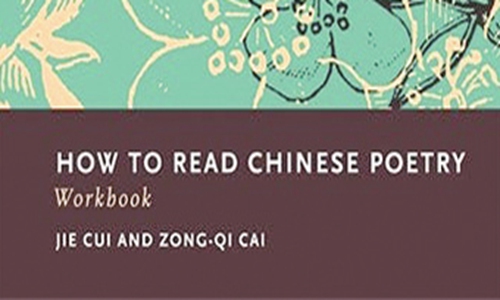Teacher finds joy in introducing Chinese literature
Sharing poetic beauty with the world

The cover of How to Read Chinese Poetry by Cai Zongqi Photo: Courtesy of Cai Zongqi
Sitting at the dining table in his home in Champaign, the US Midwestern state of Illinois, Cai Zongqi recalled his career of teaching Chinese literature and culture at the University of Illinois Urbana-Champaign (UIUC).
"I am happy, finding a job I love and sharing Chinese culture with the world... Academic research has been a life pursuit," he told the Xinhua News Agency with a smile on his face.
Having lived in the US for nearly 40 years, Cai has spent around 30 years sharing his understanding of Chinese literature with UIUC students.
In 2008, he edited and published a book titled How to Read Chinese Poetry, an anthology featuring 143 famous poems composed over a period stretching from the Western Zhou Dynasty (1046-771BC) all the way to the Qing Dynasty (1644-1911).
Back then, Cai said he couldn't find good teaching materials that could explain the beauty and cultural connotations of Chinese poems. Now with the help of the anthology, students can overcome language barriers and engage with Chinese poems in ways that yield as much aesthetic pleasure and intellectual insight as one gets from the originals.
The book is so popular that it has been reprinted time and again. Encouraged by this, Cai pressed ahead and finished books including How to Read Chinese Prose, How to Read Chinese Drama, as well as How to Read Chinese Literature jointly with Peking University Professor Yuan Xingpei.
In Cai's eyes, Chinese poems embody the Chinese people's philosophy, ethics and attitude toward life, reflecting their rich humanistic tradition, pursuit of the ideal of harmony and the Golden Mean, as well as their agony and detestation of war.
Cai holds that Chinese poems are a source of resilience of Chinese culture. Reading Chinese poems may help readers, both Chinese and American, comprehend present life from a brand-new angle and live a better life.
To bring the beauty of Chinese poems and literature to more people around the world, Cai initiated a How to Read Chinese Poetry Podcast program in 2022, inviting a dozen renowned sinologists as presenters. The program has been listed as a priority cultural exchange project by Lingnan University in Hong Kong.
The podcast program kicked off with Professor William Nienhauser of University of Wisconsin at Madison guest hosting three episodes on marriage and courtship poems at the start of the Chinese New Year in February.
Cai himself has so far hosted over 10 episodes. The program is rolling out one episode a week, and plans to produce a total of 52 episodes, with selections covering major poetic genres from all Chinese dynasties. In the podcast, poems are read aloud in English and Putonghua (Standard Chinese), as well as in Cantonese for Tang (618-907) and Song (960-1279) poetry, with classical Chinese music in the background.
In an episode, Professor Li Wai-yee of Harvard University discussed how a "barbarian" chief gains diplomatic advantages by reciting an ode included in the Shijing (The Book of Songs). In another episode, Professor Martin Kern of Princeton University discussed what Qu Yuan, a patriotic poet and minister of the ancient state of Chu during the Warring States Period (475BC-221BC), meant to Han Dynasty (206BC-AD220) intellectuals.
"I have already received emails with questions and requests for further reading from listeners both in the US and in Europe," Assistant Professor Lucas Rambo Bender of Yale University, who also participated in the podcast series, told Xinhua.
"I hope that more people will discover the podcast series over time. I'll certainly be recommending it to my students and friends," he said.
"These poems and their traditions have changed my inner life experience in many lasting ways," said Philip Merrill, a 63-year-old retired writer.
"To me, they are new wine, fine Chinese wine."
"Men hate each other because they fear each other. They fear each other because they don't know each other, and they don't know each other because they don't communicate with each other, and they don't communicate with each other because they are separated from each other," Cai quoted Martin Luther King Jr.
To help people communicate, Cai said he would make best use of his specialty in Chinese literature and poems "to share Chinese culture with the world."
Xinhua


